“The land looks like a fairytale.” — Roald Amundsen (1872—1928) about Antarctica.
“Great God! this is an awful place.” — Robert Falcon Scott (1868—1912), also about Antarctica.
Antarctica. What does that have to do with primitivism?
Probably not much. In fact, maybe just this: Antarctica told me that Mars sucks. Oh, and that Star Trek is a load of bull.
Yeah, honest. That’s what she said.
Now let me explain.
You see, when I’m not running around in the woods acting like a wanna-be neo-caveman, I have this tendency to feed my money addiction by doing seasonal work in Antarctica. Which provides for some interesting contrasts. I recently finished a stint down there, and after four months working in one of the coldest, most austere places on earth, it’s good to be: 1. not working for the man, and 2. back in warmer climes. A season in Antarctica can definitely re-invigorate one’s appreciation for places where plants grow and water flows.
What it comes down to for me is that it’s good to have an ecological context again. You see, while many of my friends who work in Antarctica join me in missing things like the smell of rain, or flowers, or dirt (or pretty much any smell other than diesel fuel, for that matter), the big thing I tend to notice as a practitioner of primitive skills is how completely powerless in relation to my own survival I become in a place like that.
Now, for most Americans this might not be so strange or disconcerting. After all, unless one knows a few old-school skills, one is pretty much dependent on industrial civilization for one’s survival anywhere. It doesn’t matter much in that regard if you’re in McMurdo Station, Antarctica, or Los Angeles, California. The food still comes pre-packaged, and the power to get it comes from cold hard cash.
But despite 15 years of studying primitive survival skills, I can’t even get a drink of water in Antarctica without gasoline and a whisperlite stove. That kinda makes me nervous.
In most places I’ve traveled, I’m continually amazed at Mama Earth’s ability to provide for us humans, but I can say this about the southernmost continent: that place is not for us.
Without industrial technology and the diesel to fuel it, there really is nothing there for us human animals. And ironically since we do have diesel to burn, the main thing for us to do there is study the effects of global warming. Go figure.
As I see it, that continent is proof that not everything in this universe was made “for man”. It might be appropriate that some places stay beyond our reach. And this realization has meaning for the values of our society. For instance, our culture tends to take for granted the idea that destiny will someday have us exploring other planets — opening them up to colonization and resource exploitation. Presidential candidates speak of sending Americans to Mars, and people cheer enthusiastically.
After Antarctica, I just don’t buy it anymore. That place is the closest thing to other-worldly exploration a fella can get without actually going into outer space. And while it’s a profoundly awe-inspiring locale, when it comes to providing a place for humans to live, Antarctica simply sucks. So while I haven’t had the chance to ask the likes of Neil Armstrong or Buzz Aldrin, I bet outer space and the moon suck too. Wouldn’t surprise me if Mars kinda follows the general trend (after all, I’ve seen the photos from the last rover).
It makes me wonder if all that pre-packaged food and lack of experiencing an ecological context has made us industrial humans so crazy that even after going to places like Antarctica, space, and the moon — even after sending a rover to Mars — many of us still think spaceships are our destiny. And that colonizing other planets might be a reasonable thing to do.
The simple fact is, we humans belong to this earth. This is where we grew into who we are. This is where our relations live. And this is where we belong. Other planets are bound to suck by comparison. The world’s indigenous cultures realize this. Really, pretty much any culture not totally mesmerised by the false promise of fossil fuels realizes this. It’s only industrial man that doesn’t quite get it.
Many of us still think our destiny lies “over there.” Always beyond here and now. But Antarctica stands in simple contrast to that belief. Antarctica was the last great place on earth “conquered” by “great explorers.” But if we listen to her, she gently whispers that “beyond” isn’t likely to deliver on our fantasies. Her cold silence speaks frankly: “I hate to break it to you guys, but Star Trek really is fiction.”
So this particular ex-trekkie turned neo-savage is going to keep exploring the land he was born on. Because North America beats the hell out of Antarctica. And probably Mars too.
Wild peace,
Glenn
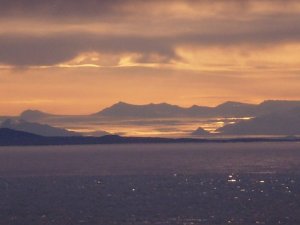
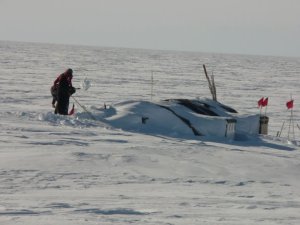
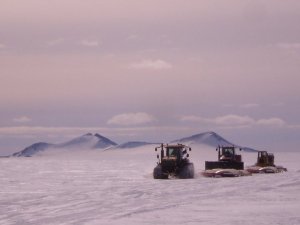
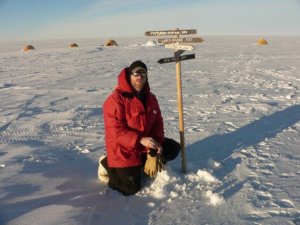
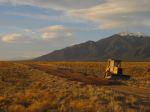
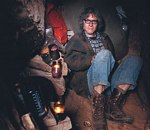

yeah, if we can’t populate Antarctica what makes us think we can make it on other planets or, even better, space ships? that’s ridiculous! another good point, Glenn.
“As I see it, that continent is proof that not everything in this universe was made “for man”. It might be appropriate that some places stay beyond our reach.”
Not only appropriate, but necessary. Although identifying something impossible as something that should necessarily be out of our reach is pretty redundant.
I live in Colorado, and even here, when I try to grow food for the four or five months out of the year that it’s possible to do so, I can’t help but marvel that people live here at all. At least the ancient tribes of the plains had some meat on the hoof that they could take advantage of, but come September, it’s time to pack up the teepee and head someplace warmer.
Thanks for the comment Jonathan. And I hear ya about gardening in Colorado…I have some good friends there who are making the “back to the land” journey, and since there are so many people in that state the only way to get enough food to be self-sufficient seems to be gardening, even though it can be tough. It’s even tougher where I live these days (Alaska), but we have the benefit of being able to hunt and fish a whole lot more to make up for our lack of veggies.
Well said. When I think about Star Trek and Antarctica, I think of that original series episode with the landing party inexorably freezing to death on the planet as night falls, while the crew are trying to fix broken tech to rescue them ….When I think about Antarctica and SF, I think of Robinson’s thoughtfully optimistic Red Mars/Blue Mars/Green Mars trilogy about the colonization and terraforming of Mars and the colony’s attempts to deal with the fact of an Earth in ecological and political collapse. The colonists, a hundred scientists from around the world, spend a year in Antarctica as preparation for dealing with the sterile landscape of Mars. Even after Antarctica, Mars still comes as a shock.
We hit minus 40 at least couple of times a winter where I live – not quite as cold as Alaska, but cold enough that the promise of spring is the only thing that makes even that worth enduring. A sustainable human future in space? Could be done under some circumstances, I’m sure, but we are so much further ahead trying to find a way to a sustainable future here, even with the mess we’ve made of the place.
“…we are so much further ahead trying to find a way to a sustainable future here, even with the mess we’ve made of the place.” Yeah, no doubt Sharon. Thanks for the comment.
http://www.cracked.com/video_18398_why-star-trek-universe-secretly-horrifying.html
Seems about right.
THANK YOU for writing THE most intelligent thing I’ve ever read about both Antarctica and Star Trek; and this is from someone who’s been dying to see Antarctica, and loves Star Trek.
I’ve read so many research articles from scientists who’ve done work down there, and shook my head. Their carbon footprint must be gigantic, yet they’re researching climate change!
I’ve seen so many episodes of Star Trek, and again, shook my head. Space is called “inhospitable” for a very good reason.
Fossil fuels supported the uniquely European myth that “mankind” can, and will, do anything, that there are no natural limits or bounds into which we must conform ourselves. Human ingenuity, wedded to human reason, can solve any problem, and you’re just some sort of naysayer crank if you think otherwise.
Thank you for illustrating, so simply and elegantly from your own direct experience, the lie behind that myth.
Sadly, that destructive idea is so ingrained in our cultural mythos and our cultural perspective, that it’s likely we’ll keep fracking for oil, sending droves of people to the South Pole, and yearning for warp drive, until we simply can’t anymore.
But by that time, we’ll have many bigger fish to fry….